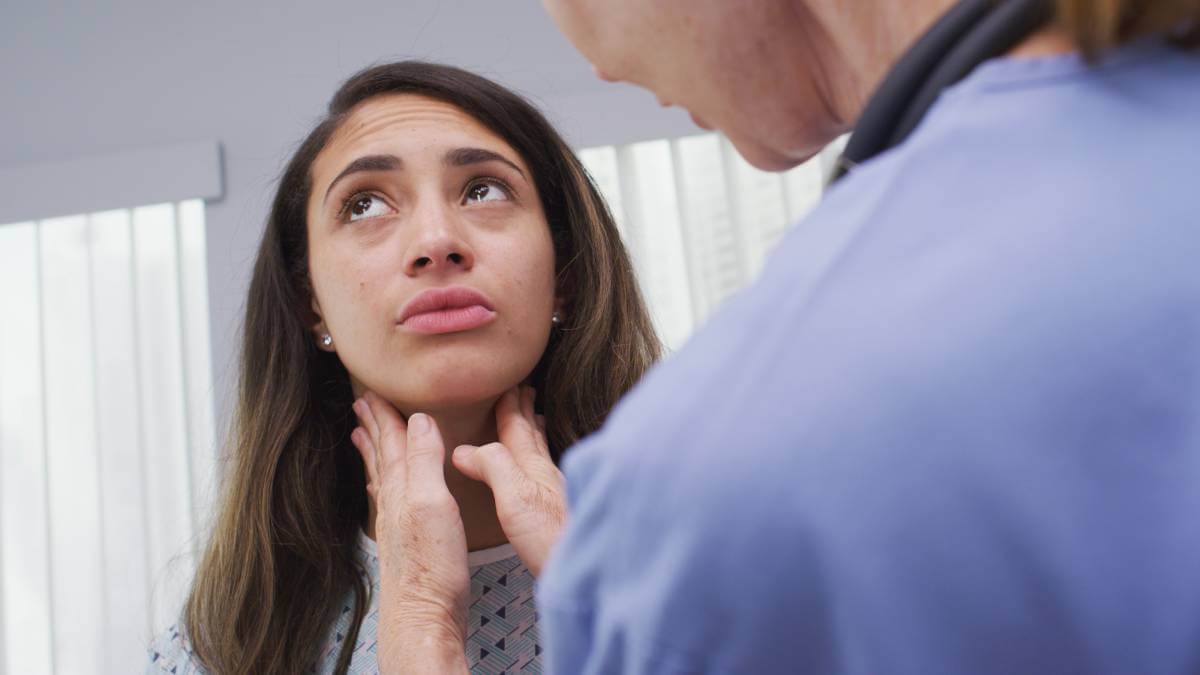Lymph nodes, associated with serious illnesses such as cancer, can be swollen by several less drastic ailments.
“Lymph nodes become swollen in response to illness, infection, or stress,” says Healthline. It says the swelling shows your lymphatic system is working to expel nasties from your body.
The most common causes are:
- ear infection
- a cold or flu
- sinus infection
- HIV infection
- infected tooth
- mononucleosis (mono)
- skin infection
- strep throat
Lymph nodes are small lumps of tissue that contain white blood cells. There are 700 of them located throughout the body, linked in chains, embedded in fatty tissue and lying close to veins and arteries. They drain lymph fluid from nearby organs or areas of the body and filter out harmful substances and waste products. Lymph nodes are important because they are part of the body’s immune system and they help fight infections. They contain immune cells called lymphocytes that can destroy cancer cells and bacteria.
The lymphatic system’s main function is to transport infection-fighting white blood cells throughout the body. Victoria’s Better Health site labels it the body’s “sewerage system”. It maintains fluid levels in our body tissues by removing all fluids that leak out of our blood vessels.
The main roles of the lymphatic system include:
- managing the fluid levels in the body
- reacting to bacteria
- dealing with cancer cells
- dealing with cell products that otherwise would result in disease or disorders
- absorbing some of the fats in our diet from the intestine.
More lymphocytes are produced when you have an infection. That is why your lymph nodes can swell when you have an infection.
Crucial to diagnosis
When the lymphatic system does not drain fluids from the tissues properly, the tissue can swell, appearing puffy. If the swelling is short-lived, it is called oedema. If it lasts longer than three months it is called lymphoedema.
The federal government’s healthdirect.gov.au site says lymph nodes are also crucial in diagnosing and treatment of cancer. Viruses and cancer cells are trapped and destroyed in the lymph nodes.
When diagnosing cancer, lymph nodes are examined to ascertain whether the condition has spread. However, having swollen lymph nodes is “only very rarely” a sign of cancer.
“Lymph nodes may be swollen due to infection or inflammation. They can swell up to several centimetres and may stay swollen for weeks after the infection has cleared up.”
How to tell you have swollen lymph nodes
“A swollen lymph node can be as small as the size of a pea and as large as the size of a cherry,” says healthline.com.
You’ll usually notice the nodes under the jaw or on either side of the neck when you turn your head or chew food.
“They can often be felt simply by running your hand over your neck just below your jawline. They may be tender.”
Other symptoms that may be present along with swollen lymph nodes are:
- coughing
- fatigue
- fever
- chills
- runny nose
- sweating
You should consult your doctor if you experience swollen lymph nodes or any of these symptoms.
The immune system’s ‘cavalry’?
Lymph nodes may also play a crucial role when we are vaccinated against COVID-19 because they contain T-cells. Nine’s Liam Mannix says T-cells are your immune system’s “cavalry”.
“Vaccine arms these troops, but when they spot an invader, they still take a few days to grow into a huge army before launching their attack.”
Scientists speculate that if the coronavirus gets through antibody defences and we get sick, the T-cell cavalry wipes out the virus before it can make us seriously ill.
Mr Mannix says if T cells are playing a big role in vaccines, it’s good news “because they offer us a very powerful defence against the new variants COVID-19 increasingly throws up”.
Lymph nodes, breast screening and COVID vaccinations
Australian women preparing for COVID vaccinations have been advised to consider when they undertake breast screening mammograms because the vaccination has been found to cause swelling of the lymph nodes in the armpits.
The Conversation reports that women have been advised to either have a mammogram first, or delay it until six weeks after vaccination.
It is estimated that one in 10 people develop swelling in their armpits following COVID vaccinations. This is not harmful and disappears within two weeks.
Treatment
“Swollen lymph nodes may become smaller on their own without any treatment. In some cases, the doctor may wish to monitor them without treatment. In the case of infections, you may be prescribed antibiotics or antiviral medications to eliminate the condition responsible for the swollen lymph nodes.” – Healthline
Rare causes of swollen lymph nodes
Swollen lymph nodes usually occur because of infection from bacteria or viruses. But on rare occasions, it can be the following:
Uncommon infections
- tuberculosis
- certain sexually transmitted infections, such as syphilis
- toxoplasmosis – a parasitic infection resulting from contact with the faeces of an infected cat or eating undercooked meat
- cat scratch fever – a bacterial infection from a cat scratch or bite
Immune system disorders
- lupus ₋ a chronic inflammatory disease that targets your joints, skin, kidneys, blood cells, heart and lungs
- rheumatoid arthritis ₋ a chronic inflammatory disease targeting the tissue that lines your joints (synovium)
Cancers
- lymphoma ₋ cancer that originates in your lymphatic system
- leukaemia ₋ cancer of your body’s blood-forming tissue, including your bone marrow and lymphatic system
- other cancers that have spread (metastasised) to lymph nodes. – Mayo Clinic.
Were you aware of the role of the lymphatic system? Have you experienced swollen lymph nodes? Let us know in the comments section below.
Also read: What does your body shape say about your health?
Disclaimer: This article contains general information about health issues and is not advice. For health advice, consult your medical practitioner.

